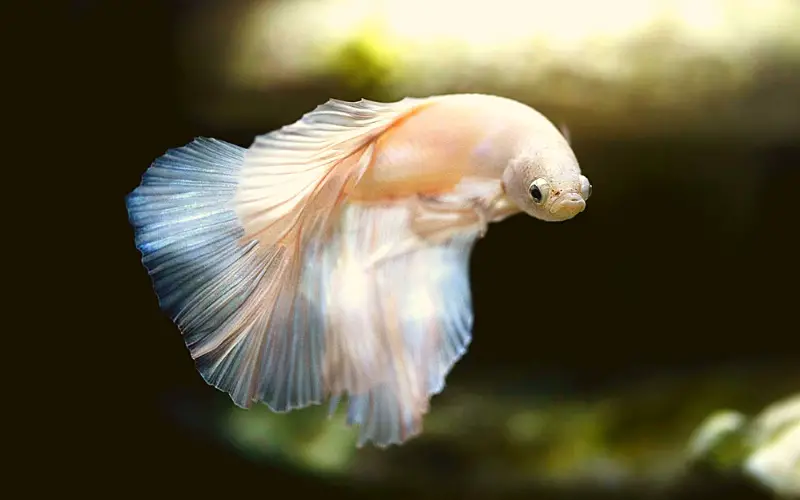Why do betta fish sleep so much? Understanding the sleeping habits of betta fish is crucial for their health and well-being. Many betta owners often find themselves questioning why their aquatic pets spend so much time at the bottom of the tank or resting in their favorite hideouts.
In this article, we will explore how long do bettas sleep, and the reasons why betta fish sleep a lot, how they sleep, and what you can do to ensure they are comfortable and healthy in their environment.
Table of Contents
ToggleWhat is Sleeping in Bettas?
Sleeping in betta fish is a natural behavior that occurs when these tropical fish enter a state of rest. Unlike mammals, bettas cannot close their eyes due to the absence of eyelids, which can make their sleeping patterns less obvious.
During this rest period, a betta’s activity levels decrease significantly, and they may stay at the bottom of the tank or hide among plants and decorations.

This state of rest is essential for their overall health, allowing them to recover and rejuvenate. The amount of sleep a betta fish requires can vary based on factors such as age, health, and environmental conditions.
While in their resting state, bettas might appear lethargic, often floating motionless or nestled into gravel or aquatic plants. It’s important for betta owners to recognize this behavior as normal rather than a sign of illness.
Observing your betta’s habits, such as the duration and frequency of their sleep, can provide insights into their well-being. Overall, understanding what sleeping means for bettas is vital for fostering a healthy aquarium environment.
How Do Betta Fish Sleep?
How does betta fish sleep? Betta fish sleep in a unique way that reflects their natural instincts. They often find a secure spot, such as under a leaf hammock or among plants, to rest.
While sleeping betta fish, they may not swim around as much, and their fins may droop slightly. This resting behavior can be influenced by the tank light, as many betta owners notice that their fish tend to sleep more when the light dims.
This mimics natural conditions in the wild, where light and dark cycles play a significant role in their activity levels.
It’s also essential to maintain a peaceful environment in the betta tank, as stress can lead to excessive sleeping. If the fish feels threatened or uncomfortable, they might retreat to the bottom of the tank more frequently.
Creating a suitable habitat with plenty of hiding spots and plants can help promote healthy sleep patterns. Therefore, understanding how bettas sleep allows owners to create an environment that supports their sleeping habits.
Signs of Increased Sleeping in Bettas
Recognizing the signs of increased sleeping in bettas is key for owners to determine if their fish are healthy. If you’ve noticed that your betta is sleeping more than usual, it might be a sign of underlying issues.
Symptoms such as lethargy, remaining at the bottom of the tank for extended periods, or a lack of appetite can indicate that your betta fish might not be feeling well. These signs should prompt owners to examine water quality, temperature, and the overall environment of the betta tank.
Moreover, if a betta fish is sleeping excessively or displaying unusual behavior, it could signal problems such as swim bladder disease or fin rot. Monitoring your fish’s activity level and behavior closely is crucial.
Pay attention if your fish is staying at the bottom of the tank or hiding more than usual. By recognizing these signs early, owners can take immediate action to ensure their betta is getting enough care and attention.
Where Do Betta Fish Sleep?
Betta fish choose specific locations within the aquarium to sleep, often seeking out areas that provide security and comfort. Common places include the bottom of the tank, nestled in the gravel, or hidden among the leaves of aquatic plants.
Many betta owners opt for a planted tank, as having foliage offers ample hiding spots where bettas can feel safe while resting. Creating a diverse environment with various decorations, such as caves and leaf hammocks, can encourage your betta to sleep comfortably.

In a well-designed betta tank, fish can find their preferred sleeping spots, which helps reduce stress. It’s important to avoid overcrowding the tank with too many decorations, as this can limit their options.
Ensuring that your betta has enough privacy and security can significantly impact their sleep patterns. Therefore, creating a habitat that mimics their natural environment enhances their overall well-being and encourages healthy sleeping habits.
7 Reasons Why Do Bettas Sleep a Lot:
Betta fish are fascinating creatures with unique behaviors, including their sleeping patterns. If your betta fish sleeping a lot, it might be due to several reasons why your betta so much, which can range from normal habits to underlying issues.
Below are common reasons for increased sleeping in betta fish:
1. Natural Resting Behavior
Betta fish are active in daylight hours and tend to sleep during the nighttime.. If they seem to sleep during the day, it might simply be their way of taking small naps to recharge.
Solution: Observe your betta’s activity cycle and ensure their tank environment mimics natural day and night cycles.
2. Tank Lighting Issues
Too much or too little light can disrupt your betta’s sleep patterns. Constantly bright environments may lead them to seek dark spots to rest, while overly dim tanks may signal them to sleep more.
Solution: Provide 8–12 hours of light and maintain a consistent schedule using an aquarium light.
3. Low Water Temperature
Betta fish thrive in water temperatures between 78–82°F (25–28°C). Cooler water can slow their metabolism, making them lethargic and prone to excessive sleep.
Solution: Use a reliable heater to maintain optimal water temperature.
4. Poor Water Quality
High ammonia, nitrite, or nitrate levels can stress bettas and lead to lethargy. Dirty water conditions can also encourage excessive resting.
Solution: Regularly test the water and perform partial water changes to keep the tank clean and safe.
5. Age and Health Factors
Older bettas naturally have lower energy levels and may sleep more. Additionally, illnesses like swim bladder disorder or parasitic infections can cause lethargy.
Solution: Observe your fish for other signs of illness, such as loss of appetite, clamped fins, or unusual swimming patterns. Consult a vet or aquatic specialist if needed.
6. Stress or Boredom
A lack of stimulation, such as plants, decorations, or hiding spots, can lead to boredom and increased betta fish sleeping period. Stress from sudden changes in the environment can also affect their activity levels.
Solution: Enrich the tank with live or silk plants, hiding spots, and decorations that mimic a natural habitat.
7. Overfeeding or Constipation
Overfeeding can lead to bloating and lethargy. A constipated betta may become inactive and sleep more to conserve energy.
Solution: Feed your betta small portions of high-quality food, and consider fasting them for a day if bloating occurs.
Final Tips for Monitoring Betta Sleep
- Check for Normal Sleep Positions: Betta fish may sleep on leaves, the tank bottom, or near the water surface. This is normal unless paired with signs of illness.
- Adjust the Environment: Ensure the tank size is at least 5 gallons, and include a low-flow filter to prevent over-exertion.
If your betta continues to sleep excessively despite ideal conditions, it might be worth consulting a specialist to rule out health concerns.
How to Stop Your Betta Fish from Sleeping So Much
To help your male betta fish stay active and reduce excessive sleep, ensure they receive 8-12 hours of light per day. I’ve noticed that my betta tends to sleep for long periods, especially when there’s too much darkness or insufficient decor.
Adding some plants or a background substrate can create a more stimulating environment. If your fish is staying behind the filter or hiding, it could be due to stress.
Participating in a forum community dedicated to betta fish can provide tips for a better experience. Consider investing in a light timer to regulate their light exposure effectively.
Make sure to monitor water parameters regularly, as poor conditions can lead to lethargy. A veterinary consultation may be necessary if you notice unusual changes in color on his body or signs of illness.
Be cautious about introducing new fish into the tank, as it may cause panic and stress for your betta. Always research compatibility, especially if you have a sorority setup.
If your betta fish is sleeping so much, remember that they can enter a deep sleep state, but excessive lethargy can indicate other issues, including bacterial infections. If javascript is disabled in your browser, please enable javascript to access valuable resources on betta care.
How Much Sleep Do Betta Fish Need?
The amount of sleep a betta fish needs can vary, but generally, they require around 12 hours of rest per day. This is typically balanced with 12 hours of light, mimicking natural daylight cycles.
Many betta owners find that their fish tend to sleep more during the night when the tank light is turned off. However, it’s crucial to monitor your betta’s sleeping patterns to ensure they’re getting enough rest without excessive inactivity.
Providing an optimal environment with a consistent light and dark cycle can help regulate your betta’s sleep schedule. If you notice that your betta is sleeping excessively or appears lethargic, it may be essential to evaluate their tank conditions and health.
Ensuring your betta fish are getting adequate sleep is key to maintaining their overall health and vitality. Therefore, understanding how much sleep betta fish need will enhance their quality of life in the aquarium.
When do betta fish sleep?
When do fighting fish sleep? Betta fish typically sleep during the night, although they may take occasional naps throughout the day. Their sleep cycles are often influenced by the light and dark conditions in their environment.
Many betta owners have observed that their fish become less active when the tank light dims, indicating that they are preparing to sleep. Creating a consistent schedule with a reliable tank light can help establish a healthy routine for your betta, allowing them to experience restful periods.
In addition, environmental factors such as stress or changes in routine can affect when a betta sleeps. If the tank experiences loud noises or disturbances, your betta may feel inclined to hide and sleep more often.
Understanding when your betta fish sleep can help you create a peaceful environment that promotes healthy sleeping habits. By ensuring that your betta has a suitable routine, you can support their overall health and well-being.
Commonly Asked Questions about Betta Fish Sleeping Behavior (FAQs)
How do betta fish look when they sleep?
How betta fish do sleep? Betta fish sleep by resting motionless at the bottom of the tank or near a hiding spot. Their fins may droop slightly, and their breathing may slow down.
Do betta fish move when they sleep?
No, betta fish usually don’t move while sleeping. They remain still, often resting on the bottom of the tank or near a hiding spot.
Why does my betta sleep so much?
Betta fish can sleep for extended periods, sometimes for several hours. This is normal behavior. However, excessive betta fish sleeping can indicate stress, poor water quality, or illness.
Why my betta doesn’t sleep?
Bettas are active fish and often rest near the surface. They may appear not to sleep due to their behavior. Ensure your betta’s environment is suitable for rest.
Do betta fish close their eyes when they sleep?
No, betta fish cannot close their eyes. They lack eyelids, so their eyes remain open even when they sleep.
Do Betta fishes sleep at night?
Do bettas sleep at night? Yes, betta fish do sleep at night. They are most active during the day and tend to rest more at night when the lights are off. However, their sleep patterns can vary.
How long do fish sleep betta?
How long do betta fish sleep? Betta fish sleep in short bursts throughout the day and night. The total amount of sleep varies, but they typically rest more at night.
How do i know if my betta fish is sleeping?
How do bettas sleep? Betta fish may rest near the bottom or float motionless. Look for slow gill movement. Ensure a quiet environment for undisturbed rest.
Do betta fish sleep with their eyes open?
Betta fish can sleep with their eyes open. They may appear inactive but are still resting. Watch for reduced movement and slow gill activity during this time.
Do bettas sleep at the top of the tank?
Betta fish often rest near the top of the tank. They may float motionless or rest on plants or other surfaces close to the water’s surface.
Conclusion
How do i know if my betta is sleeping? In conclusion, understanding why do betta fish sleep a lot is essential for every betta owner. Recognizing their unique sleeping patterns, the ideal conditions for rest, and the signs of excessive sleeping can help ensure that your betta remains healthy and happy. By providing a suitable environment that mimics their natural habitat, you can promote better sleep and overall well-being for your aquatic pet. If you notice any concerning behaviors or signs of lethargy, consulting a veterinarian can help address potential health issues. Ultimately, fostering a nurturing environment for your betta fish will enhance their quality of life, allowing them to thrive in your aquarium.
their natural environment and encourage them to settle in for the night.
You might also like
- Betta Bubble Nest 101 – Everything You Should Know (Solved)
- Do Betta Fish Float When They Die? Top 5 Reasons Bettas Die!
- Why Did My Betta Fish Die Suddenly? Top 9 Reasons (Revealed)
- Do Betta Fish Need Light? – Should They Be (ON at Night)
- How Do Betta Fish Sleep: 3 Ways to Catch Them Snoozing
- Can a Snail Kill a Betta Fish: A Comprehensive Beginner Guide
- 7 Reasons Betta Fish Flaring Its Gills & (How to Handle It!)
- How to Tell If a Betta Fish Is Happy: (7 Telltale Signs)
- Can Betta Fish Recognize Their Owners: (The Surprising Bond)
- Do Betta Fish Breathe Air for Extra Abilities (Unveiled)




